“They seem to think that children can’t have their own opinion and take action for what they know is right.”
It’s a familiar refrain. A sense of not being listened to. Of being dismissed as naïve or immature. But ask those involved in the school climate strikes to explain their motivations, and it’s clear they’ve thought hard about what they’re doing.
The global school climate strike movement has caught the world’s attention, sparked last summer by Swedish schoolgirl Greta Thunberg’s solo protest, and is taking to the streets again on 20 September.
Organisers are hoping for the biggest mobilisation yet, with support coming from both civil society and parts of the business world.
Similar actions have been taking place across the UK since the first major walkout in February. But what’s going to be different this time?
“The situation is getting so urgent that we needed to do something radical – and I think the school strikes are a really effective way of putting pressure on the government. We really are at a point where we can’t talk and debate and mess around any longer. We need action now,” explains 14-year-old Holly Gillibrand.
She started “school striking” for the climate at the start of this year in her home town of Fort William.
A nature-lover for as long as she can remember, she’d seen what Greta was doing in Sweden and felt inspired to follow suit.
Since her first climate strike, which she organised with a couple of friends back in January, she’s done the same every Friday morning for 32 weeks.
Like what you see? Become a patron today!
Something bigger
Huddled between Ben Nevis and Loch Linnhe on the west coast of Scotland, Fort William has a population of just 10,000. So when compared with the mass demonstrations seen in London, Holly might look as though she’s ploughing a lonely furrow.
If she’d worried about how many others would join her protests, which have ranged from 40 people to just herself on some days, she probably wouldn’t have ever started.
But numbers aren’t the point, she says. The important thing is to be honest not only about the “climate emergency”, but broader environmental destruction too.
She also knows she’s part of something bigger: the Scottish Youth Climate Strike group she belongs to is in turn a member of the global “Fridays for Future” movement led by Greta.
And she’s upbeat about the protests on the 20th:
“I hope it’s going to be a tipping point in environmental activism because it’s set to be the biggest environmental protest in human history.”
Holly speaking about her activism at the Edinburgh International Book Festival in August. Photo credit: Callum Bennetts
Another young campaigner getting ready for the “general strike” for the climate is Jenni Wall, a sixth-form student from Watford. She’s proof that, whatever your view on all the climate protests of recent months, they’ve managed to engage lots of young people in politics for the first time.
Jenni admits she picked Politics A-Level as “a bit of a throwaway option” but quickly realised how much she enjoyed it, even helping to invite speakers to talk to her school’s Politics Society.
But until a friend of hers asked if she wanted to get involved in the regional branch of the UK Student Climate Network (UKSCN), which has been helping to coordinate the strikes and is calling for a “Green New Deal”, she hadn’t found a cause that would be worth spending her time on.
Unsurprisingly, Jenni is disappointed with what she sees as a failure of older generations to tackle the problem with the urgency it demands.
“I don’t really know how it’s got to this stage without major political intervention happening already. Ultimately, climate change supersedes all of the other political issues that we’re constantly talking about at the moment.”
For Jenni, that includes the “B” word:
“It just doesn’t matter in the end if Brexit works or not, because there’s no point in it, there’s no point in a successful society if we don’t have a world to live in.”
Praise and criticism
The climate strikers have won support from many, including thousands of scientists and academics who say their message is “justified and supported by the best available science”. But the movement hasn’t been spared from criticism.
Both Holly and Jenni are aware of the cynical view some have taken of their protests, and they’ve found it frustrating at times.
For Holly, the accusation that she and her fellow strikers are “political pawns in an adult’s campaign” has been especially dispiriting. She accepts she may not know what the best course of action is, but feels it’s important for her generation to sound the alarm:
“As a child who hasn’t had a full education, I’m not in a position where I can tell the people in power what they need to be doing. I think they need to be the ones to figure that out for themselves and then take those actions.”
Read more about the school strike movement.
In Jenni’s eyes, the tide does seem to be turning, though.
During protests in central London earlier in the year, they frequently had people “coming up and insulting them to their faces”, Jenni says. But there’s now a greater understanding of what they’re trying to achieve, she feels:
“I think there’s less hostility now. Initially, there were quite a few people saying: ‘you’re just causing disruption for the sake of it’ or ‘you’re just doing it to miss school.’”
‘We can’t do this by ourselves’
Whereas previous climate strikes have been organised by and for school students, with a few adults tagging along, Holly is keen for the upcoming mobilisation to cut across generational divides:
“What’s different about this strike is that we’re asking the adults to join us. Since Greta started last year, it’s mainly just been the youth, but now we’re calling on adults, because we can’t really do this by ourselves. We need support from everyone.”
One adult who is responding to that call is Beth Mark, a 32-year-old mother-of-one from South London, who ran hostels for the homeless before her son was born.
“Being a parent, I think sometimes you feel things a lot more strongly, take it a lot more personally. You feel that everything in your body wants to protect your child from this thing that is going to be potentially devastating to them.”
She’d always been aware of the impacts of climate change but it was only when she had her son 18 months ago that the implications really hit home.
“That was when I really started taking notice of the news and the urgency of it. It suddenly felt very real and urgent. I’m worried for my child’s future and I’m worried that there will be social unrest.”
Since the birth of her son, Beth has started blogging as a way to spread awareness about the threat of climate change, and says she’s noticed an uptick in interest around the issue from both her own friends and the wider public.
In May, she went along to a “Mother’s Rise Up March” organised by the Women’s Environmental Network, where she heard about a new group set up to support the young climate strikers.
“While I was there, I got handed a leaflet by ‘Parents for Future UK’ and it basically said what you could do if you want to keep the momentum going.”
The group was formed earlier in the year by a small group of parents, some of whom had children who were involved in the strikes. Beth makes clear that the group is open to anyone “concerned about the next generation”, not just parents.
She’d been inspired by the message the young climate strikers were putting across and wanted to find a way to support them, “through a sense of guilt, I suppose, at inaction from the previous generation.”
As passionate as the younger generation might be, a boost from older generations, who have more experience of politics and the law, could really benefit the movement, she says.
Photo credit: Beth Mark.
The group’s plans for the upcoming strike aren’t fully formed yet, but Beth explains that their main idea is to set up an area specifically for families during the day, probably in one of London’s major parks.
“The feedback I’ve received from some people going along with young children is that words like “strike” and “rally” are putting people off and making them a bit nervous and unsure about whether it is a family-friendly event. So our goal is to make it as family-friendly as possible.”
Another aspect of the movement that can be off-putting to some is its focus on big cities, and particularly London. But Jenni hopes UKSCN’s move to create more local and regional groups will encourage new people to get involved.
“What we’re hoping for is people in the local areas to see that we’re there, to raise awareness, and for people in local schools to come along and join us, maybe not this time, maybe not even next time, but in the future.”
In the past, she and others from her area involved in UKSCN would go to the bigger protests in London. This time, they’re organising strikes in Hertford, Stevenage and St Albans, where it should be easier for students to come and take part. They’ve even had some local primary school teachers say they plan on bringing their classes along to find out what it’s all about.
Beth’s parents’ group is similarly looking at ways to build a network of local clusters around the country, who can support young climate activists in their area, as well as hold politicians and councils to account on the issue.
‘We’re going to have to continue striking for a while’
Although the upcoming climate strikes are expected to be bigger than anything before, none of the young activists see it as the end of their campaign.
Holly’s under no illusions about the scale of the task at hand and says in order to pressure political leaders to take the necessary action, there are going to need to be “many more global strikes”.
But the politics student in Jenni acknowledges there are good reasons for hope, with a warning shot at politicians ever concerned about popularity at the ballot box:
“At some point in time, the government are going to realise that this isn’t just an issue for hardcore activists, it’s an issue that they need to work on, if not for the world, then because they need the votes, they need the political support.”
Or, to put it another way, if decision-makers want to hold on to their jobs, sooner or later they’re going to need to realise these young people have opinions of their own, and they’re not afraid to act on them.
Photo credit: Beth Mark.
Subscribe to our newsletter
Stay up to date with DeSmog news and alerts









